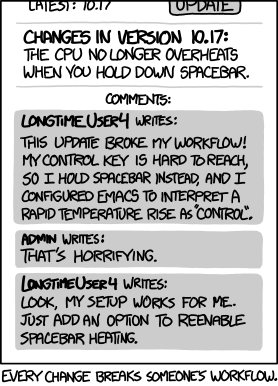I would hate to change this.
I’ve used Markdown a bit more than I have TW’s wikitext (although the crossing point may be fast-approaching.) Markdown—in many of its variants, including the original—does the same thing, a mechanism inspired by plain text email, USENET, and other earlier communication channels. These were often delivered over systems that limited lines to some small length, such as 80 characters.
I generally format my documents that same way. Markdown was written to be familiar to users of such systems and to be readable in source form. I still really like that ideal, although working in TW has dampened that enthusiasm a bit.
But I simply find the following much less readable:
"When in the Course of human events, it becomes necessary for one people to dissolve the political bands which have connected them with another, and to assume among the powers of the earth, the separate and equal station to which the Laws of Nature and of Nature's God entitle them, a decent respect to the opinions of mankind requires that they should declare the causes which impel them to the separation.
"We hold these truths to be self-evident, that all men are created equal, that they are endowed by their Creator with certain unalienable Rights, that among these are Life, Liberty and the pursuit of Happiness...."
than I do this:
"When in the Course of human events, it becomes necessary for one people to
dissolve the political bands which have connected them with another, and to
assume among the powers of the earth, the separate and equal station to which
the Laws of Nature and of Nature's God entitle them, a decent respect to the
opinions of mankind requires that they should declare the causes which impel
them to the separation.
"We hold these truths to be self-evident, that all men are created equal, that
they are endowed by their Creator with certain unalienable Rights, that among
these are Life, Liberty and the pursuit of Happiness...."
But I still want this to wrap when displayed. To combine the proper wrapping with the more readable text, I need either to signal the end of lines in some way, such as <br/> tags or @pmario’s Space-Space-Newline plugin, or to invoke some CSS to handle this, such as
<div style="white-space: pre-wrap;"> ... </div>
But that latter would then not introduce <p> elements I would like to target for styling.
I’m happier with the status quo on this.
 all thanks to the prioritization of backwards compatibility.
all thanks to the prioritization of backwards compatibility.
